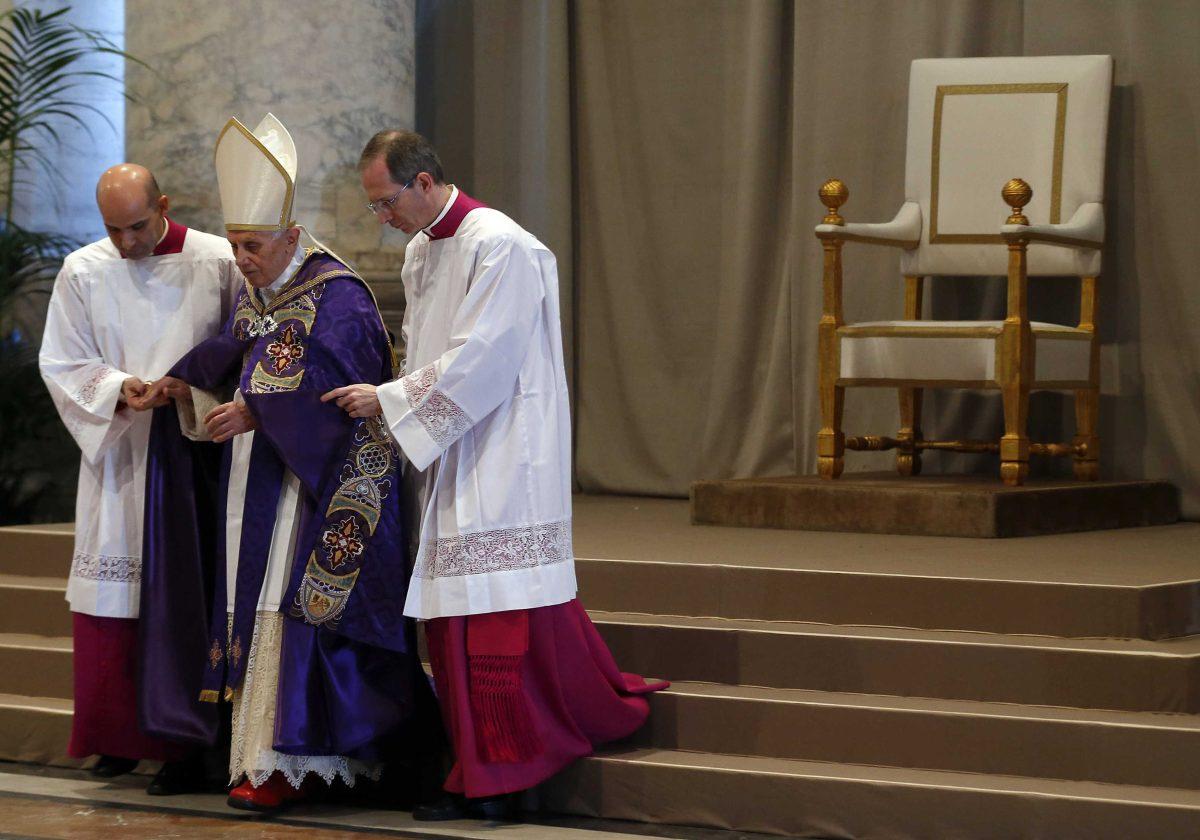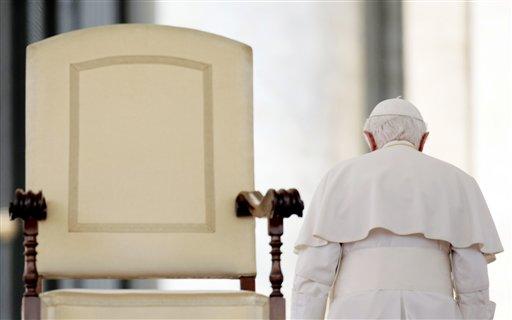The Pope, infallible mouth piece of God and leader of more than a billion Catholics worldwide, put in his two weeks notice on Monday.
Benedict XVI has declared his intent to vacate the Throne of Saint Peter by the end of this month, an act unheard of in modern Catholicism.
Key the stirring music and white smoke over the Sistine Chapel — we’re going to have a new Pope by Easter, or so says Vatican spokesman Rev. Federico Lombardi.
And all signs are pointing to the next Pontiff being quite different than the last.
The last time a Pope (Gregory XII) willingly surrendered the Papacy was in 1415, 600 years ago.
Needless to say, Benedict’s resignation has gone off about as well as a bomb shell.
Despite the fact that the news has come as a shock to Catholics and religion columnists around the globe, it’s not as though Benedict XVI hasn’t been dropping hints.
In a 2010 interview for the book “Light of the World” by Peter Seewald, Benedict told the author that he felt any Pope who was unable to physically, psychologically or spiritually continue to discharge his duties has an obligation to step down.
It’s an almost exact replica of the list of reasons the ailing Pontiff gave to a stunned Vatican audience early Monday morning.
“I have come to the certainty that my strengths, due to an advanced age, are no longer suited to an adequate exercise of the Petrine ministry,” the Pontiff read in Latin.
Traditionally, the Papacy has been viewed as a position bestowed by God, given up only in death.
Benedict went on to stress that in today’s rapidly changing world, the Pontificate requires a leader of sound mind and spirit.
And while it is clear the Holy Father still has his wits about him, it seems Benedict XVI — who is now 85 and one of the oldest Popes in recent memory — wishes to spare his beloved Church the long fight with dementia that so crippled the power of the Papacy under his lionized predecessor, John Paul II.
The two lasting questions of the Pope’s resignation are who will succeed him, and what will his legacy be?
The former question warrants a column all unto itself, as there is a dizzying number of possible candidates.
Paddy Power, an infamous Irish gambling organization, is already running odds on who shalt next wear Saint Peter’s weighty crown, or tall funny-shaped hat, whatever.
They’ve got Cardinal Peter Turkson at 3 to 1 odds (With U2’s Bono trailing the pack at 1000/1 and Richard Dawkins at 666/1) to win the Papacy in March.
Why is that particularly interesting?
Peter Turkson is African, and the Cardinal of Ghana. All of the top five candidates hail from outside of traditional popedom, i.e. Europe and Italy in particular.
There are two Africans, two Latin-Americans, and a Canadian, go figure.
More so now than any other point in history the Catholic Church could be on the precipice of electing a non-white, non-European Pope.
That’s what makes the most sense, as these days, the vast majority of Catholics are neither white nor European.
In fact, they are predominantly African and Latino — Brazil is the largest Catholic country on Earth.
This shift in ethnic demographics could foretell a shift in church doctrine or at least a shift in church focus.
That brings us to the second question of what will Benedict XVI’s legacy be?
Once the dust has settled, perhaps in a century or two, he’ll be remembered as one of the best Popes to sit upon the apostle’s chair — because he’s the hero Gotham deserves, but not the one it needs right now.
Most folks don’t know Cardinal Ratzinger, the man who would become Benedict XVI, single handedly convinced former Pope John Paul II to put him in charge of the church’s ongoing hunt for pedophile pastors.
He then presided over the largest culling of priests and clerics in Church history.
By his own words, Ratzinger swore to clean the church of the “filth” that is pedophilia, and he prosecuted his mission with extreme prejudice.
He was the first Pope to meet with victims and their families, and he helped institute all of the new policies and safe guards the church has implemented in the hopes of making sure this sort of thing never happens again.
Times are changing, and fast.
The church is attempting to drag itself from the ashes of a crisis Benedict XVI almost single handedly attempted to surmount.
Benedict XVI’s resignation is a symbolic move intended to signal the inauguration of a new era in the Catholic Church, an era to be defined not by the evil that has passed, but by the good that can be done.






